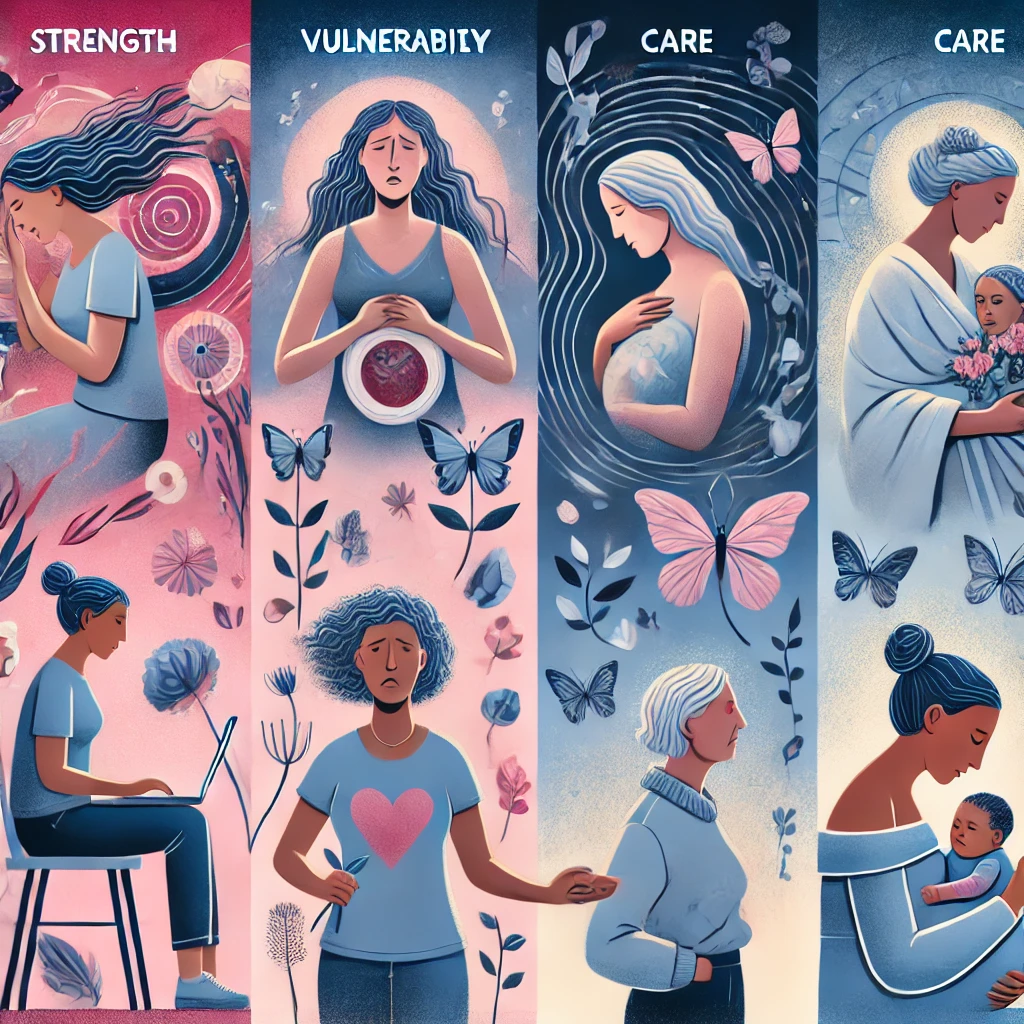Women experience a unique set of challenges and emotions
many of which are deeply influenced by biological, societal, and psychological factors. Female-centric issues are not only rooted in physical experiences, such as menstruation, pregnancy, and menopause, but also in the emotional and mental landscape that accompanies them. In addition to these biological aspects, societal expectations, gender roles, and cultural norms also heavily influence the emotions and feelings women navigate in their daily lives. Understanding these emotional complexities is essential to fostering empathy, awareness, and support for women everywhere.
1. Emotional Impact of Menstruation
Menstruation is a biological process that all women experience, yet it carries significant emotional weight. From the onset of menstruation (menarche) in adolescence to the final stage (menopause), hormonal fluctuations cause a wide range of emotional responses. These changes can make women feel everything from irritation to sadness, commonly known as Premenstrual Syndrome (PMS).
During PMS, some women experience heightened emotional sensitivity, mood swings, anxiety, or depression. This is largely due to the changes in estrogen and progesterone levels, which can influence serotonin production—the hormone responsible for mood regulation. Unfortunately, society often trivializes these feelings, leading many women to feel misunderstood or unsupported.
2. Pregnancy and Motherhood
Pregnancy is often celebrated as one of the most beautiful experiences in a woman’s life. However, it also comes with a complex set of emotions. From excitement and anticipation to fear and anxiety, pregnancy is a journey that can feel emotionally overwhelming. Hormonal changes, the physical toll of carrying a child, and the responsibility of impending motherhood can lead to stress and anxiety, sometimes manifesting as prenatal or postpartum depression.
During pregnancy, many women experience a loss of self-identity as they shift focus from personal desires and career ambitions to nurturing life. The emotional and psychological pressure of becoming a caregiver, the constant societal expectations of being a “perfect mother,” and the reality of balancing work and family responsibilities can lead to intense feelings of guilt, inadequacy, or frustration.
After childbirth, many women experience postpartum depression, a serious mental health condition that involves feelings of sadness, irritability, and fatigue, affecting their ability to care for themselves and their baby. Despite its prevalence, postpartum depression is often stigmatized, leaving many women to suffer in silence.

3. Navigating Gender Roles and Expectations
From a young age, girls are often socialized to prioritize nurturing and caregiving roles, whether in relationships, family dynamics, or even workplaces. These expectations can create significant emotional strain, as women are often expected to juggle multiple roles simultaneously, such as being a mother, wife, daughter, or professional. The pressure to fulfill these roles without appearing overwhelmed often results in feelings of burnout, frustration, and resentment.
Societal expectations regarding beauty, body image, and behavior further exacerbate these emotions. Women are frequently judged based on their appearance and are under pressure to conform to unrealistic beauty standards, leading to issues like low self-esteem, body dysmorphia, or eating disorders. Women’s mental and emotional health is also impacted by cultural ideals of how they should behave—often expected to be accommodating, nurturing, and soft-spoken while suppressing assertiveness or ambition.
4. The Emotional Toll of Inequality and Gender Bias
Gender inequality remains a pervasive issue across the globe, affecting women in various ways—ranging from the wage gap to limited access to education and career advancement opportunities. These systemic inequalities can lead to feelings of frustration, helplessness, or anger. When women work just as hard as men but receive less recognition or pay, it can create deep emotional scars, eroding self-worth and motivation.
In the workplace, women often face additional emotional labor—tasks such as mediating disputes, supporting coworkers, and managing relationships. This emotional labor is typically unrecognized and uncompensated, further burdening women.
5. The Complex Emotions of Menopause
Menopause, a natural biological transition, can be emotionally challenging for many women. As their bodies change, they may experience a sense of loss—loss of fertility, youth, or even identity. Hot flashes, night sweats, and hormonal imbalances can cause mood swings, anxiety, or even depression. Many women also face societal stigma around aging, leading to feelings of invisibility or irrelevance.
Additionally, women often experience a shift in life priorities during menopause, as they may transition from raising children or focusing on careers to a more introspective phase. This can lead to a reevaluation of life choices and purpose, evoking complex emotions about the future and the self.
6. Female Empowerment and Emotional Resilience
Despite these challenges, women demonstrate incredible emotional resilience. Women around the world are increasingly advocating for their rights, equality, and mental health. Movements such as feminism, body positivity, and reproductive rights have empowered women to voice their concerns and demand change.
Women are also supporting each other through online communities, support groups, and feminist advocacy, which offer spaces to share emotions, personal experiences, and resources. By embracing vulnerability, women are learning to manage their emotions, acknowledge their struggles, and redefine their narratives.
Conclusion
Female-centric issues and emotions are deeply intertwined with biology, societal expectations, and the pressures of modern life. Understanding the emotional and psychological experiences of women is key to fostering a more compassionate and supportive world. Whether it’s the hormonal fluctuations of menstruation, the anxiety of motherhood, the emotional labor of gender roles, or the frustration of inequality, women navigate a vast emotional landscape. By acknowledging these unique challenges and creating open spaces for dialogue, we can help women feel more empowered, supported, and understood.











